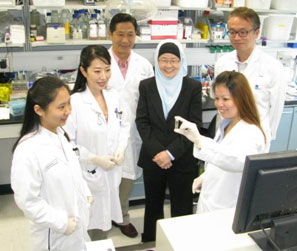
IBN research team (from R-L): Dr Susi Tan, Dr Motoichi Kurisawa, Prof Jackie Y. Ying, Dr Shujun Gao, Dr Joo Eun Chung and Ms Nunnarpas Yongvongsoontorn
Singapore: A group of researchers from Institute of Bioengineering and Nanotechnology (IBN) is using green tea ingredients to develop a drug delivery system to kill cancer cells more efficiently.
A key ingredient in green tea, epigallocatechin gallate (EGCG), is an antioxidant which is known to have therapeutic applications in the treatment of many disorders including cancer.
"The numerous health benefits of green tea have inspired us to utilize it in drug delivery systems. This is the first time that green tea has been used as a material to encapsulate and deliver drugs to cancer cells. Our green tea nanocarrier not only delivered protein drugs more effectively to the cancer cells, the combination of carrier and drug also dramatically reduced tumor growth compared with the drug alone. This is an exciting breakthrough in nanomedicine," said Professor Jackie Y Ying, executive director, IBN.
A key challenge in chemotherapy is ensuring that the drugs are delivered only to the tumor in order to avoid harming the surrounding healthy tissues and organs. To address this, researchers have focused their efforts on developing more effective drug carriers. When injected into the body, these carriers act like homing missiles, traveling through the body to zoom in on the target cells where they will release the cancer-destroying drugs.
A major stumbling block in designing more effective carriers for drugs has been the drug-to-carrier ratio. Specifically, the capacity of a particular carrier limits the amount of drug that it can deliver. Effective therapy would typically require the administration of substantial amounts of drug-encapsulating vessels into the body. Unfortunately, existing carriers are made of materials that have no therapeutic effect, and they may even cause side effects if used in large quantities.
IBN has designed a therapeutic nanocarrier for drug delivery using novel compounds derived from EGCG. The core of this carrier is made of an oligomer of EGCG (OEGCG), which can encapsulate drugs and proteins, such as Herceptin, a protein drug currently used to treat breast cancer. Polyethylene glycol (PEG)-EGCG was used to form the shell of this carrier. This novel compound is constituted of PEG, which is a known 'stealth' molecule that acts to camouflage the carrier, preventing it from being detected and filtered out of the body by the immune system before it reaches the tumor. Micellar nanocomplexes of less than 100 nanometers in dimension are formed from the OEGCG core and PEG-EGCG shell, protecting the protein drug from rapid proteolysis and renal clearance, while providing for tumor targeting.
The research team conducted animal studies to evaluate the performance of IBN's green tea-based protein delivery system. The study revealed that IBN's green tea nanocomplex loaded with Herceptin reduced tumor growth much more effectively when compared to administering Herceptin on its own. Using the new nanocarrier, twice as much drug accumulated in the cancer cells, indicating an improved tumor targeting ability. At the same time, the drug accumulation in the other organs was lowered substantially, by 70 percent in the liver and kidney, and by 40 percent in the lung.
"We have developed a green tea-based carrier, in which the carrier itself displayed anti-cancer effect, and can boost cancer treatment when used together with the protein drug. Unlike conventional therapy, our green tea carrier can eradicate more cancer cells, and accumulate significantly less drugs in vital organs where they could cause adverse side effects. This invention could pave the way for a better drug delivery system to fight cancer," said Dr Motoichi Kurisawa, IBN Principal Research Scientist and Team Leader.
IBN has filed a patent on their green tea nanocarrier and is developing this technology for clinical applications. The green tea-based micellar complexes are also being examined for the delivery of active ingredients in personal care and nutritional products.




